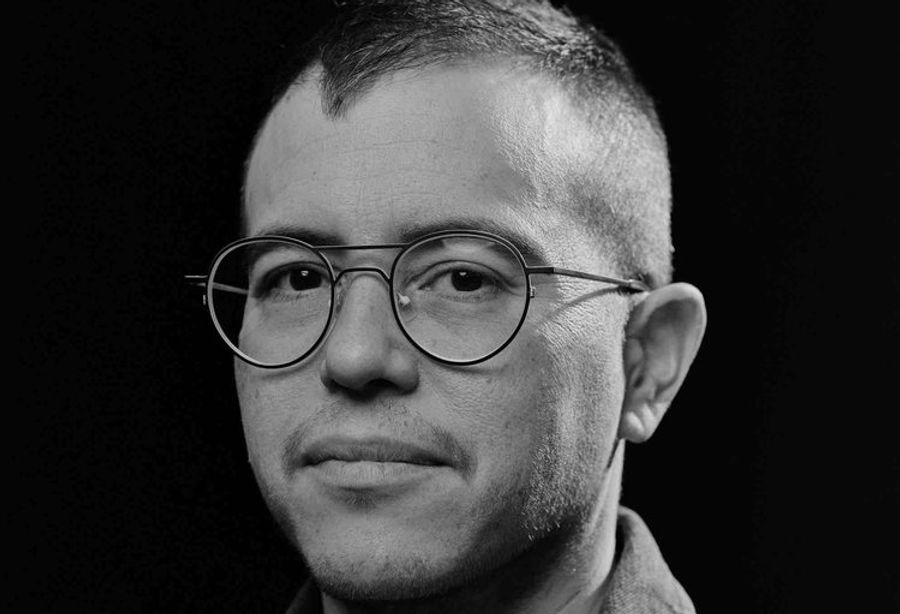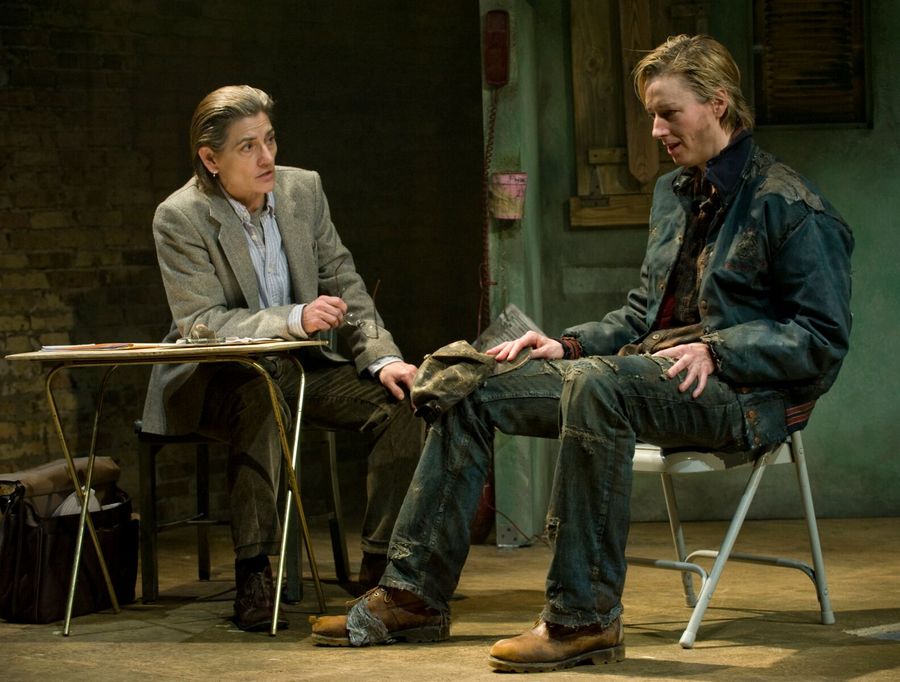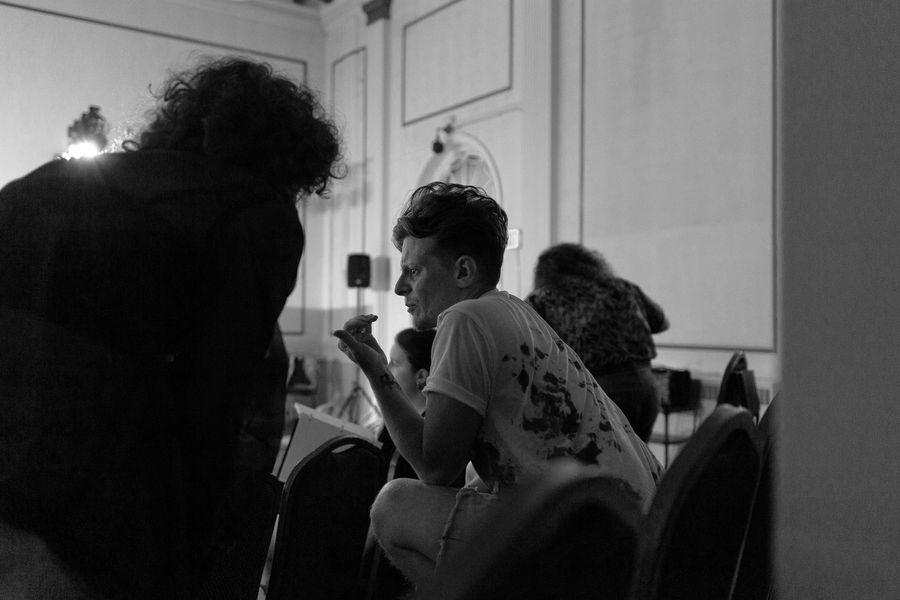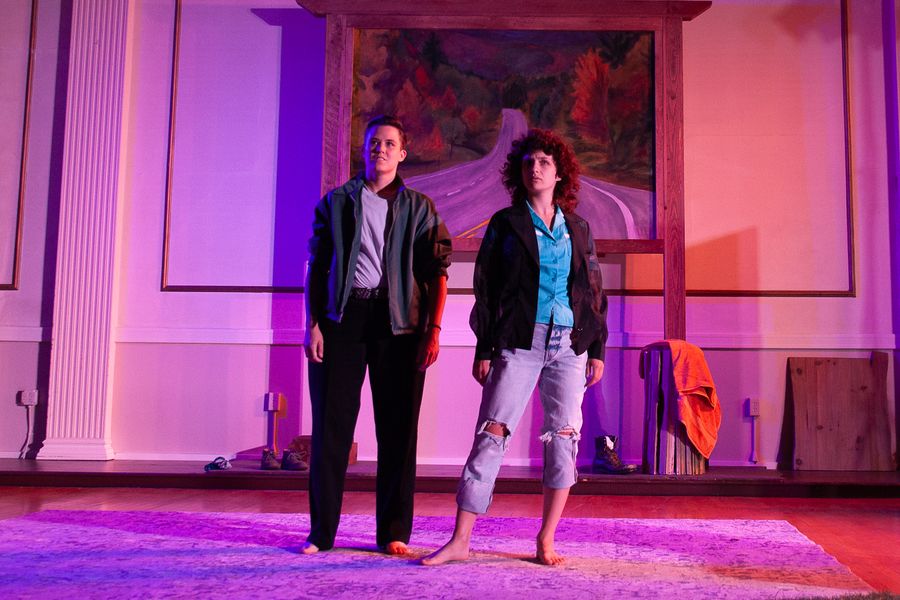It was 2005, and playwright Sylvan Oswald wanted to write complex, exciting roles for transmasculine actors. But it was 2005, and Oswald didn’t know that word yet. Instead, he was inspired both by what he saw on the American stage, and what he didn’t: by the performances of venerated queer actors like Peggy Shaw and Dominique Dibbell, and by a chance encounter with actor-creator Becca Blackwell during a street performance of Circus Amok.
Though it was less than two decades ago, the mid-2000s were a starkly different moment for trans visibility in American theatre. Few institutions were making notable efforts to cast trans actors in trans roles, and trans characters that did appear onstage were often the creations of cis playwrights. Trans-centered initiatives like the Trans Lab (2018) and the Breaking the Binary festival (2022) were years away.
As a young playwright, Oswald had dreamed of a theatre that included trans and butch roles. Drawing on butch influences from Gertrude Stein to Peggy Shaw, he learned to write those characters even in the absence of the trans-centered vocabulary that is more commonplace now. That same year, he read a New York Times article reporting on generational fissures between older butch lesbians and young trans men. (Were young trans men betraying queer feminist legacies simply by being men? Had an older generation missed out on the gender-affirming care that became more available, though hardly equitably accessible, in the 2010s?) Oswald was driven to stage not just a queer and trans cast of characters, but an intergenerational conversation among them.

Pony, the play that emerged, was particular: It would demand a stage world populated by a spectrum of queer and trans characters, no cis men, and honest, poetic conversations about trans experience.
That meant figuring all this out himself. As he built Pony, charting a path fraught with gendered violence and illuminated by many forms of love, an unexpectedly resonant source material made its way in: Georg Büchner’s unfinished 1837 play Woyzeck, that tersely apocalyptic tale of socioeconomic oppression and male brutality.
Now it’s 2022, and Pony is about to open for its second full production at the Portland Theater Festival in Maine, Aug. 18-Sept. 4, under the direction of actor and theatremaker Jess Barbagallo. (The play’s premiere was in 2011, at Chicago’s About Face Theater.) More than simply a second production, this new staging is an event so meaningful for the play and for trans visibility onstage that during the first rehearsal, Oswald called the production less a revival than a “rebirth.” The new production of Pony reflects increasing recognition for Oswald’s writing, and, more broadly, expanded institutional efforts to produce trans stories well beyond New York, and to cast trans actors in roles that align with their genders.
“For Pony to be receiving its second production 11 years after premiering is hugely validating,” Oswald told me. Among other things, he pointed out, this means that there are enough transmasculine actors to fill the roles, and that there is a community ready and waiting for this play, neither of which were a given even 10 years ago.
Pony is not an adaptation of Woyzeck so much as a complex, dramatically rich response to it. Büchner’s original is foundational both for modernist movements like Expressionism and for dramatic responses to capitalism, including the works of Brecht. It’s also a poster child for gendered violence in the modern theatre: Its title character, driven by systemic oppression into feverish desperation, translates fear and rage into the murder of his girlfriend Marie. In Pony, which takes place “on the other side of the forest from Woyzeck” (but also in a post-industrial upstate New York town), there are two Maries. One is not a character but part of the play’s exposition, a woman we never meet because she was murdered before the play began. The other Marie—Oswald’s Marie, and ours—is a dive bar waitress obsessively (but unofficially) investigating the crime, not because she wants to “solve” it but because she wants to understand. She’s also the center of a love story that includes Oswald’s title character, Pony, who has turned up in this rundown hamlet after being released from prison and looking for a new start.

The character Pony is, in Oswald’s precise, alluring words, “a gender non-conforming/transmasculine heartthrob.” This description is important not only because it has evolved since Oswald’s first draft, but because the play maps out a landscape of transmasculinity, distributed across generations and imbued with theatrical life, that is not often seen on the American stage. Its oldest character is Cav, a stone butch in her late 50s, and its youngest is Heath, a trans man in his early 20s, who has come to town seeking a father figure, a queer, trans, or gender-nonconforming elder absent from his life. Completing the constellation is Stell, a cis woman who, like Pony, is in love with Marie. But though there’s a love triangle at the play’s center, the generational sparks between Cav and Heath—the anxiety and excitement—are as integral to Pony as romantic love.
This intergenerational queer conversation is rare, Barbagallo told me, even now. “Obviously queer theatre happens in New York,” he said, “but a queer play that has a trans protagonist and that’s dealing with the internal politics of being in queer community? This play is fully legible; the dreams of the characters can be followed by anyone. But the shorthand that is happening around this butch-to-trans masculine spectrum—there aren’t a lot of plays doing that.”
In the decade and a half since Oswald began writing it, Pony has had a storied and significant life in queer theatre circles. An initial 2007 reading introduced Barbagallo to the play as an actor (and also featured Kate McKinnon of later SNL fame). Oswald workshopped the play at Portland Center Stage in Oregon and at New York Theatre Workshop, and the 2011 Chicago premiere was directed by Bonnie Metzgar.
Since then, copies of Pony have circulated among actors and directors, in rehearsal rooms and in university classrooms. One day Barbagallo heard from a friend, actor Dave Register, who he’d met as part of the Broadway cast of Harry Potter and the Cursed Child. Register said he was working with a nonbinary actor in his scene study class, and wanted to offer them a substantive role that aligned with their gender. Barbagallo didn’t have to think too hard: He sent a copy of Pony.
“Pony never left my mind after I read it the first time,” Register said. “Sylvan’s writing is so economical and sparse and essential—it’s like a good poem. What is existing between the lines is just as important as what is said. I could feel that tension radiating through the lines.”
Now, in the inaugural year of Register’s Portland Theater Festival, Barbagallo is directing Pony, and Ian-Meredythe Lindsey—the actor for whom Register first read the play—will play the lead. “It’s an absolute honor to have Sylvan entrust Portland Theater Festival with stewardship and caretaking,” Register said.

Inspiration for the festival came last year, when Register produced Annie Baker’s The Aliens on the back porch of a Portland coffee shop, and knew he wanted to do more local theatre. Conceiving his festival, Register told me, meant reckoning with assumptions about the gender and racial diversity (or lack thereof) in the coastal Maine town (pop. 67,000). In making intentional choices to program diversely and take a local approach to casting, Register hopes to challenge other Portland-area producers to take a hard look at lack of gender and racial diversity on their stages.
This first edition of the festival—co-produced by Register’s home institution, East Shore Arts, and Mayo Street Arts—is running three productions consecutively, from mid-July to early September: Baker’s Body Awareness, Antoinette Nwandu’s Pass Over, and Pony. All three emerged from Register’s experience teaching acting in Portland.
The joy of participating in a local production of Pony was palpable during the first rehearsal (I had the privilege of observing on Zoom). Cast members reflected on longstanding desires for greater trans visibility in the Portland area. Actors spoke of their connections to the characters and to Oswald’s writing, and Oswald described the play’s history and journey, recalling its origins and describing its evolution. As Oswald told me, the presence of this second production testifies to a “critical mass” of trans and gender nonconforming actors, directors, and audience members who need this play. It also testifies to generational conversations that echo those in the play: Barbagallo told me that as a young queer actor, reading the role of Heath in that 2007 presentation “was part of my edification.” Fifteen years later, he reflected, “I’m an elder to that character now.”
This production also allows the play new life in the wake of revisions Oswald has made over many years in response to evolving conversations about LGBTQ+ experience: The current draft is, he writes, “a ‘reparative’ revision, to borrow critic Jaclyn Pryor’s phrase.” In initial iterations, Pony lived in a remote, run-down town to escape a life where he couldn’t be out as trans. After conversations with trans writer Jacob Anderson-Minshall during the 2008 Portland Center Stage workshop, Oswald more clearly understood the implications of presenting trans characters as inextricably trapped in old lives or ashamed to come out. He changed the personal history, propelling Pony to the town where he meets Marie, Stell, Cav, and Heath.
More recently, Oswald rethought the show’s physical intimacy. In an early draft, Marie unbuttons Pony’s shirt and sees his bound chest, which is, for Pony, a deep violation. The 2022 version offers a different possibility. “Because this play is meant to subvert gendered violence, not replicate it, Pony’s body shall not be revealed,” writes Oswald in stage directions. “Our bodies do not define our genders.”
Barbagallo reflected on the play’s provocative, subtle dialogue about consent and intimacy. “Sylvan always writes with great sensitivity in listening to the vulnerable body,” he said. “The crux of the story is: Will I let someone touch me here, will I let someone touch me here,” when until recently “there wasn’t discourse around that.”
Meanwhile Oswald’s work, which often situates queer and trans stories alongside deep questions about genre, language, and geography, has seen increasing recognition over the past five years. A Kind of Weather, a metatheatrical meditation on the genre of the trans coming-out story, premiered in 2020 at San Diego’s Diversionary Theater. Trainers, which is part queer dystopia and part dramatic dialogue with the astonishing 16th-century essays of Michel de Montaigne, premiered at London’s Gate Theater, also in 2020, and was published by Oberon Press. High Winds, originally an artist’s book and later a performance piece, toured to Austin’s Fusebox Festival in April 2022, and will play at the Oregon-based TBA festival this fall.
In the meantime, Pony will claim space in Mechanics’ Hall, a historic venue built as a gathering place for Portland’s earliest maker and artisan community, now a lively performance and literary event space. This layered history makes it a fitting space for Pony, whose layered histories are as pleasurable and silly as they are painful. “When we’re dealing with an oppressive structure,” Barbagallo said, “I’m figuring out how much fun can still be found within that. I’m figuring out where this play can feel exuberant and wild.”
Miriam Felton-Dansky (she/her) is associate professor of Theater & Performance at Bard College.





